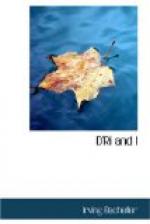The silence of the room was broken only by the scratch of a quill in the hand of the general. I glanced about me. On the wall was a large painting that held my eye: there was something familiar in the face. I saw presently it was that of the officer I had fought in the woods, the one who fell before me. I turned my head; the young man was looking up at me. A smile had parted his lips. They were the lips of a rake, it seemed to me. A fine set of teeth showed between them.
“Do you know him?” he asked coolly.
“I have not the honor,” was my reply.
“What is your name?” the general demanded in the deep tone I had heard before.
“Pardon me,” said the young man, quietly, as if he were now weary of the matter, “I do not think it necessary.”
There was a bit of silence. The general looked thoughtfully at the young man.
“If your Lordship will let me—” he went on.
“My dear sir,” the other interrupted, in the same weary and lethargic manner, “I can get more reliable knowledge from other sources. Let the fellow go back.”
“That will do,” said the general to the guard, who then covered my eyes and led me back to prison.
Lying there in the dark, I told D’ri all I knew of my mysterious journey. My account of the young man roused him to the soul.
“Wha’ kind uv a nose hed he?” he inquired.
“Roman,” I said.
“Bent in at the p’int a leetle?”
“Yes.”
“And black hair shingled short?”
“Yes.”
“An’ tall, an’ a kind uv a nasty, snookin’, mis’able-lookin’ cuss?”
“Just about the look of him,” I said.
“Judas Priest! He’s one o’ them sneks et tuk me when you was fightin’ t’ other feller over there ’n the woods.”
“Looks rather bad for us,” I remarked.
“Does hev a ruther squeaky luk tew it,” said he. “All we got t’ dew is t’ keep breathin’ jest es nat’ral ‘n’ easy es can be till we fergit how. May fool ’em fust they know.”
I had a high notion, those days, of the duty of a soldier. My father had always told me there was no greater glory for anybody than that of a brave death. Somehow the feeling got to be part of me. While I had little fear of death, I dreaded to be shot like a felon. But I should be dying for my country, and that feeling seemed to light the shadows. When I fell asleep, after much worry, it was to dream of my three countrymen who had fallen to their faces there by the corn. I awoke to find the guard in our cell, and D’ri and he whispering together. He had come with our breakfast.
“All I want,” D’ri was saying, “is a piece of iron, with a sharp end, half es long es yer arm.”
He made no answer, that big, sullen, bull-dog man who brought our food to us. When he had gone, D’ri lay over and began laughing under his breath.
“His thinker’s goin’ luk a sawmill,” he whispered. “Would n’t wonder ef it kep’ ‘im awake nights. He was askin’ ’bout thet air tew thousan’ dollars. Ef they ’ll let us alone fer three days, we ‘ll be out o’ here. Now, you mark my word.”




